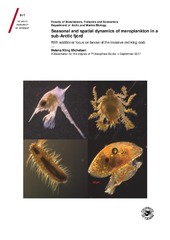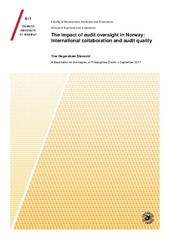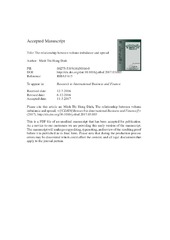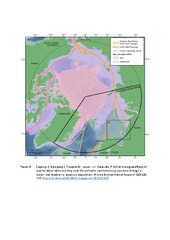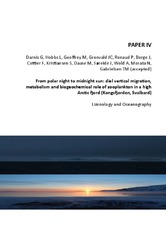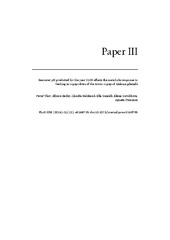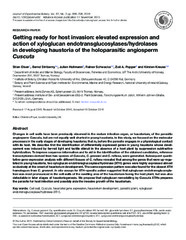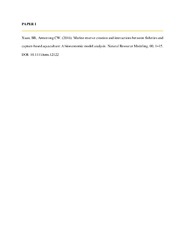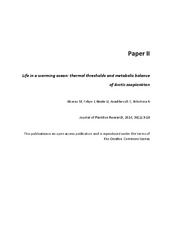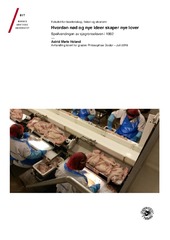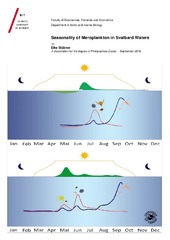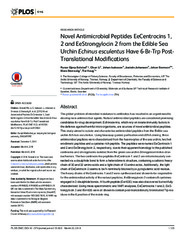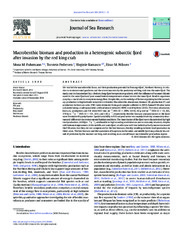Doktorgradsavhandlinger (BFE-fak): Nye registreringer
Viser treff 141-160 av 300
-
Endogenous sharing of knowledge
(Doctoral thesis; Doktorgradsavhandling, 2017-12-13)This thesis investigates the willingness of firms to cooperate on Research and Development (R&D). I present three papers concerning incentives to share/exchange knowledge created by the firms’ own R&D. It is my hope that this thesis can give some clues of how sharing and exchange of knowledge can contribute to an already large literature on Research and Development. -
Seasonal and spatial dynamics of meroplankton in a sub-Arctic fjord With additional focus on larvae of the invasive red king crab
(Doctoral thesis; Doktorgradsavhandling, 2017-12-07)Many benthic marine organisms produce pelagic larvae, meroplankton, which spend from hours to months in the pelagic. During this time, they form an important part of the pelagic community. Few studies have focused on the year round dynamics of meroplankton, thus many aspects of meroplankton dynamics remains unknown at high-latitudes. In the 1960s the red king crab was intentionally introduced into ... -
The influence of product, contextual and individual characteristics on food evaluation
(Doctoral thesis; Doktorgradsavhandling, 2017-11-04)The overall objective of this thesis is to provide insights with regard to how characteristics of the product, the context and the individual relate to consumer evaluation of food products. This thesis considered evaluation of food as a global attitude and as an evaluation of various attributes as expectations or experiences, and explore how evaluation is influenced by product, contextual and ... -
The impact of audit oversight in Norway: International collaboration and audit quality
(Doctoral thesis; Doktorgradsavhandling, 2017-09-22)The purpose of this thesis is to explore the nature of the audit oversight system and examples of national and international collaboration by means of a joint inspection process between the Public Company Accounting Oversight Board (PCAOB) of the United States and the Financial Supervisory Authority of Norway (FSA). In addition, the thesis will analyze literature regarding how auditors detect fraud ... -
Topics on market microstructure and asset pricing using intraday data from the Oslo stock market.
(Doctoral thesis; Doktorgradsavhandling, 2017-08-23)What drives asset prices in the financial market? How can we predict these prices? Finding the relationship between different factors or between different variables could help to answer these questions. First, links between asset pricing models and other market microstructure variables can be used to investigate sources to explain asset prices. Second, rapid changes in the microstructure ... -
"Navigare necesse est". Bio Environmental implications of shipping in the European Arctic
(Doctoral thesis; Doktorgradsavhandling, 2017-06-08)Ocean shipping has for centuries been essential to mankind, and is the most efficient way of transporting goods across the world. With increasing global temperatures, the Arctic ice cap is reduced in thickness and extent, making Arctic shipping more feasible. The thesis looks into the biological and environmental implications of shipping in the European Arctic Seas. A scenario involving a shipping ... -
Gut metagenomics in relation to diet and methanogenesis in arctic herbivores
(Doctoral thesis; Doktorgradsavhandling, 2017-06-01)Enteric methane (CH4) from gut microbial fermentation of complex organic polymers in ruminants comprises an important source of the anthropogenic CH4 emissions and may also represent a significant loss of metabolic energy to the host animal depending on diet. CH4 is produced by specialized microbes called methanogens. Extensive research exists on enteric CH4 production and methanogens in domestic ... -
Understanding winter patterns of zooplankton Diel Vertical Migration (DVM) in a high Arctic fjord (Kongsfjorden, Svalbard)
(Doctoral thesis; Doktorgradsavhandling, 2017-05-09)Recent Arctic studies contradict a long-held paradigm of winter quiescence by documenting activity at many trophic levels in the marine food web even during the darkest months of winter. Previous studies have failed to identify which species are performing patterns of vertical migrations during polar night in Kongsfjorden (Svalbard). In the present study, acoustic data supplemented by zooplankton ... -
The fate of a key Arctic copepod in future ocean acidification: Integrating molecular, organismal, and evolutionary thinking in the face of climate change
(Doctoral thesis; Doktorgradsavhandling, 2017-05-05)Uptake of anthropogenic carbon dioxide (CO2) into the world’s oceans is increasing seawater acidity in a process termed ocean acidification. This is predicted to have harmful effects on a variety of marine organisms. With the greatest and fastest changes in pH expected to occur the Arctic seas over the next 100 years, the need for understanding the effects of low pH on Arctic marine organisms is ... -
Mechanisms of Host Plant Infection by the Parasitic Angiosperm Cuscuta
(Doctoral thesis; Doktorgradsavhandling, 2017-05-12)The highly adapted parasitic plants of the genus Cuscuta infect other plants to steal their water and nutrients. They do so by developing specialized organs called haustoria that grow into the tissue of the host plant establishing interspecies connections through which the parasite feeds. Although it has long since been suggested that some manner of modification to host cell walls is necessary to ... -
Microbial community variation in an Arctic shelf seafloor. Biogeographic and anthropogenic influences
(Doctoral thesis; Doktorgradsavhandling, 2017-04-21)Studying the spatial patterns of microbial diversity is crucial in order to assess the relationship between community structure and ecosystem function. However, due to methodological limitations in the past, relatively little has been known about the biogeography of microbial communities. The introduction of next generation sequencing technologies from 2005 was a game changer, as DNA sequencing ... -
Economic analysis of Marine Protected Areas: Bioeconomic Modeling and Economic Valuation Approaches
(Doctoral thesis; Doktorgradsavhandling, 2017-04-05)Marine protected areas (MPAs) are often established for conservation objectives. Benefits provided by MPAs exceed pure biodiversity conservation as they may include contributions to social and economic benefits of local communities. And though it is still debated, MPAs may provide a management tool for sustainable fisheries and/or solving conflicts of interests between users of marine resources. It ... -
Calanus glacialis and C. finmarchicus in a warming Arctic Implications of increasing temperature at the individual and population level
(Doctoral thesis; Doktorgradsavhandling, 2017-03-21)Climate change is particularly pronounced in the Arctic and water temperatures are predicted to increase substantially. This has important implications for Arctic marine organism, especially ectotherms, such as copepods. The calanoid copepods Calanus glacialis and C. finmarchicus are key species of different pelagic food webs at high latitudes and changes in temperature will likely affect them ... -
Mass cultivation of some common coldwater diatoms (Bacillariophyceae): lipids vs. growth conditions
(Doctoral thesis; Doktorgradsavhandling, 2017-02-27)The present study was aimed at investigating northern diatoms as sustainable sources of omega-3 fatty acids widely used and now much needed in salmon aquaculture as well as ingredients to be used in nutraceuticals in the human diet. As known, fish oil is currently the main source of physiologically requisite fatty acids such as eicosapentaenoic (EPA) and docosahexaenoic acids (DHA). Due to the rapid ... -
Hvordan nød og nye ideer skaper nye lover: Speilvendingen av sjøgrenseloven i 1992
(Doctoral thesis; Doktorgradsavhandling, 2017-01-13)Avhandlingen viser hvordan lovverket gjenspeiler samfunnets skiftende behov og virkelighetsoppfatninger. Eksempelet som brukes for å illustrere dette, er en lovendringsprosess i fiskerisektoren. Frem til 1992 var det forbudt for utenlandske fiskere å levere fisk i norsk havn. En ressurskrise, torskekrisa i Nord-Norge på slutten av 1980-tallet, gjorde at det ble stilt spørsmål ved dette forbudet: ... -
Seasonality of Meroplankton in Svalbard Waters
(Doctoral thesis; Doktorgradsavhandling, 2016-12-14)The temporal dynamics of meroplankton, manly comprised of larvae of benthic invertebrates that only temporarily inhabit the pelagic environment, is poorly understood in Arctic environments. The main objective of this thesis was to increase our knowledge on meroplankton dynamics and their ecological role in the Arctic marine coastal ecosystem. Three different approaches including high-frequency field ... -
Interventions using digital tools to improve students’ engagement and learning outcomes in higher business education
(Doctoral thesis; Doktorgradsavhandling, 2016-11-25)The purpose of the present study was to develop interventions using digital tools to improve student engagement and learning outcomes. The empirical context was an undergraduate finance course wherein digital learning and assessment interventions were important features of the course design. When designing the interventions, the development activities were underpinned by pedagogical principles ... -
Antimicrobial peptides in Urticina eques and Echinus esculentus. Isolation, characterisation, and structure-activity relationship studies
(Doctoral thesis; Doktorgradsavhandling, 2016-12-09)Bacterial resistance to antibiotics has become a serious global problem. Infections that once were easily cured with antibiotics have now become nearly impossible to treat. Thus, there is a desperate need for new antibacterial drugs. Antimicrobial peptides (AMPs) are a diverse group of compounds. Amongst their unique features are their ability to kill bacteria (often both Gram-positive and Gram-negative) ... -
Adjuvant combinations with the Toll-like receptor ligand CpG - Protective immune responses in Atlantic salmon
(Doctoral thesis; Doktorgradsavhandling, 2016-12-01)Aquaculture is in need of improved viral vaccines to meet the demands of a growing sustainable industry. Fish viral vaccines are often based on less immunogenic antigen (Ag) formulations that require adjuvants to elicit sufficient protection. Toll-like receptor (TLR) agonists holds high immunostimulatory properties and are in mammals well explored vaccine adjuvants. The potential of synthetic ... -
The role of the invasive red king crab in the food web of a high-latitude fjord Studying macrobenthic communities and trophic control in Porsangerfjord, northern Norway
(Doctoral thesis; Doktorgradsavhandling, 2016-11-24)Biological invasions are a major challenge facing coastal waters and increasingly threaten high-latitude environments. The red king crab is one of the world’s largest decapods and was introduced into the Barents Sea in the 1960s. It has since become a valuable fishery resource in Russian and Norwegian waters. In the early 2000s, red king crabs entered Porsangerfjord, which now holds one of the ...


 English
English norsk
norsk
